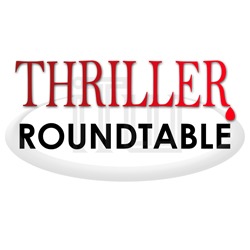

November 29 – December 5: “Who struggles more to write across gender lines, male or female authors?”
Before a reader can care about what happens to the characters in a thriller, the characters have to ring true. Is it difficult to write across gender lines? Join ITW members LJ Sellers, Teresa Burrell, Allison Leotta, David Morrell, DP Lyle, Daryl Wood Gerber and Shane Gericke for a thought-provoking Roundtable discussion.
L.J. Sellers is an award-winning journalist and the author of the Detective Jackson mystery/suspense series. The Sex Club, Secrets to Die For, and Thrilled to Death have been highly praised by Mystery Scene and Spinetingler magazines. Her fourth Jackson story, Passions of the Dead, will be released soon. L.J. also has two standalone thrillers, The Baby Thief and The Suicide Effect. When not plotting murders, L.J. enjoys standup comedy, cycling, social networking, mystery conferences, and editing fiction.
Teresa Burrell has dedicated her life to helping children and their families in both the courtroom and the classroom. As an attorney in San Diego, Burrell maintained a private law practice for twelve years, which specialized in domestic, criminal, and civil cases. Her work in juvenile court focused on representing abused minors and juvenile delinquents. Burrell has received several awards and special recognition from the San Diego Volunteer Lawyer Program for her countless hours of pro bono work with children and their families. Burrell has also enjoyed a satisfying career as a teacher. She has taught children of all ages with diverse backgrounds and special needs. After creating an after-school program that kept kids off the street, she received a community service award. Now in semi-retirement in California, Burrell continues to educate groups about social issues impacting children and write novels, many of which are inspired by actual legal cases.
Allison Leotta is a federal sex-crimes prosecutor in Washington, D.C. She has been a federal prosecutor for ten years. Like her heroine, Allison started out in the U.S. Attorney’s Office prosecuting misdemeanor domestic violence cases. She now handles the most serious sex crimes in D.C. Allison is a graduate of Michigan State University and Harvard Law School. She lives with her husband (who is also a federal prosecutor) and their two sons in Takoma Park, Maryland. “”Law of Attraction”” is her first novel.
David Morrell is the New York Times bestselling author of twenty-eight books, including his award-winning Creepers and Scavenger. “The mild-mannered professor with the bloody-minded visions,” as one reviewer called him, Morrell is the author of thirty-two books, including such high-action thrillers as The Naked Edge, Creepers, and The Spy Who Came for Christmas (set in Santa Fe, New Mexico, where he lives). Always interested in different ways to tell a story, he wrote the six-part comic-book series, Captain America: The Chosen. His writing book, The Successful Novelist, analyzes what he learned during his four decades as an author. Morrell is a co-founder of the International Thriller Writers organization. Morrell is a three-time recipient of the distinguished Bram Stoker Award. Comic-Con International honored him with its Inkpot Award for his lifetime contributions to popular culture. The International Thriller Writers organization gave him its prestigious ThrillerMaster Award. With eighteen million copies of his work in print, his work has been translated into twenty-six languages.
D.P. Lyle MD is the Macavity Award winning and Edgar® Award nominated author of the non-fiction books, MURDER & MAYHEM, FORENSICS FOR DUMMIES, FORENSICS & FICTION, and HOWDUNNIT: FORENSICS as well as the thrillers, DEVIL’S PLAYGROUND, DOUBLE BLIND, and STRESS FRACTURE, the first in his new Dub Walker Series. His essay on Jules Verne’s THE MYSTERIOUS ISLAND appears in THRILLERS: 100 MUST READS. His next Dub Walker novel, HOT LIGHTS, COLD STEEL, and the first of his Royal Pains tie-in novels, ROYAL PAINS: FIRST, DO NO HARM, will be released June, 2011. He has worked with many novelists and with the writers of popular television shows such as Law & Order, CSI: Miami, Diagnosis Murder, Monk, Judging Amy, Peacemakers, Cold Case, House, Medium, Women’s Murder Club, 1-800-Missing, and The Glades.
Daryl Wood Gerber writes the Cheese Shop Mystery series as Avery Aames. The first of thee books, The Long Quiche Goodbye, published in July 2010. The series is set in idyllic Holmes County, Ohio, and features Charlotte Bessette, a feisty cheese shop owner with a colorful extended family. Daryl has also had short stories published and she created the format for the successful TV series Out of this World that ran for four years in first-run syndication. Daryl podcasts some of her suspense/thriller work on her website. Prior to writing, Daryl was an actress in Los Angeles. A fun tidbit for mystery buffs: she co-starred on the popular series, Murder, She Wrote and Matlock. Daryl graduated from Stanford University. She enjoys golfing, swimming, photography, gardening, gourmet cooking, and has been known to jump out of a perfectly good airplane.
National bestselling novelist Shane Gericke (pronounced YER-key) launched his writing career in high school as a $30-a-month sportswriter. He liked it so much he never looked back. He spent the next 25 years as a newspaper editor, most notably at the Chicago Sun-Times. He then turned to thrillers, with Torn Apart, Blown Away and Cut to the Bone quickly establishing him as one of our foremost masters of suspense. His work appears in translation around the world. Chairman of the international book festival ThrillerFest and a founding member of International Thriller Writers, Shane lives in the Chicago suburb of Naperville, Illinois.
- LAST GIRL MISSING with K.L. Murphy - July 25, 2024
- CHILD OF DUST with Yigal Zur - July 25, 2024
- THE RAVENWOOD CONSPIRACY with Michael Siverling - July 19, 2024

